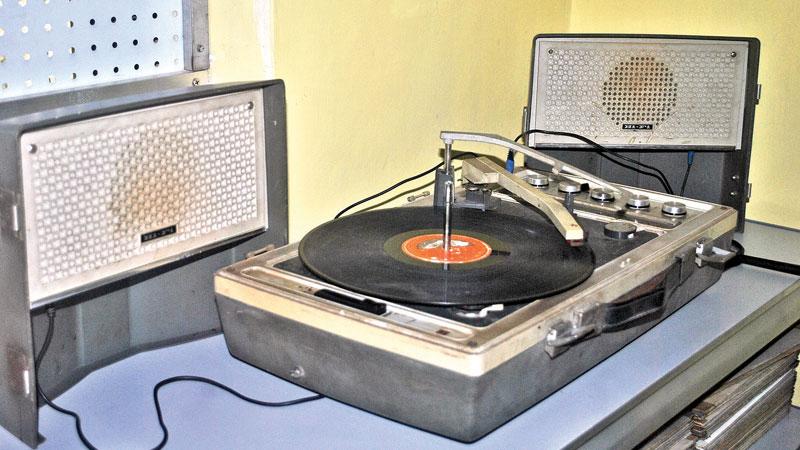
Throughout history, many musicians and styles of music have come and gone. Few are the songs that are enjoyed by whole generations, the young and the old alike. Who would not like to hear the great singers of yesteryear such as, Rukmani Devi, Eddie Jayamanne and others of their ilk even today? Take Sunil Shantha, for instance. “Olu pipila wela lela denava sudata sudey nango; Olu nela la mala gothala paladimu api nango”. This all time favourite by the maestro of song, is able to bring serene beauty to anyone, regardless of age or race. The wonder is, one does not have to really understand the words to appreciate such songs. Humour, love, the sadness of parting and nature’s beauty are all intertwined in the melodies.
Living in the hustle and bustle of the modern world, one would give much to just sit and listen to these songs, in their original form. Now, there is a group of interested persons who have come forward to enable us do just that... sit and listen to the songs of these maestros of yesteryear.
The Society of Sri Lankan Record Collectors (SSLRC) with 200 members islandwide, has come forward to shoulder the task of preserving the rich Sri Lankan musical heritage and bequeathing it to future generations. Roshan Wedagamage is the President of SSLRC, and Saman Pushpakaumara, the Treasurer, said Pradeep Wickramasinghe the Secretary.
Wickramasinghe said, a wide spectrum of people ranging from professors to students and music lovers make use of their resources and work in collaboration with them.
 They not only preserve music for posterity but allow students, researchers and music lovers to study and enjoy the music of yesteryear at the Society’s premises: 12/11, Rupasinghe Mawatha, Nugegoda, free of charge.
They not only preserve music for posterity but allow students, researchers and music lovers to study and enjoy the music of yesteryear at the Society’s premises: 12/11, Rupasinghe Mawatha, Nugegoda, free of charge.
Records used to preserve the music of days gone by, including, long playing and extended ones, magnetic tapes, CDs, and all other mediums to store songs and music could be seen here.
Through the conservation of these timeless musical treasures, we are able to enjoy them today, as they are. The music made on the serphina (Indian harmonium), veena, flute, tabla, dolakkiya, low country (pahatha rata) udakkiya, davula, thammattama and talam pota can now be enjoyed in all their melodious harmony, thanks to the efforts of the SSLRC.
The song from the film ‘Sath Samudura’ -’ Sinidu sudumudu thalawe. Pipena pena pidu sinase’ has been preserved by the Society. The song has been set to music by maestro Somadasa Alvitigala while the incomparable voice of Pandit Amaradeva brings this song to life. Many such musical gems are preserved for posterity here. Songs by the singing sensations of yesteryear such as, Sunil Shantha, Ananda Samarakoon, Eddie Junior, Rukmani Devi, Karuna Devi Siriwardene, Mahagama Sekera, Pandit Amaradeva, Eddie Jayamanne, Mohideen Baig, G.S.B. Rani, Sujatha Attanayake, P. Susila, Milton Mallawaarachchi, Desmond de Silva, Vernon Warnakulasuriya, Indrani Perera, Sisira and Indrani Senaratne, Victor Rathnayake and C.T. Fernando, all covering different time spans are safeguarded by the SSLRC for future generations.
In addition, Hindi and Tamil songs are preserved on CDs and group songs too are preserved for posterity.
The fact that songs sung by former stars are preserved helps modern students of music to recognise the melodies and other facets of such songs.
The focus of the Society is to preserve the originals of the old songs for future generations, for their enhancement of knowledge and enjoyment of the music, Wickremasinghe said. Thomas Alva Edison first gave the world a machine to store the sounds of the voice and broadcast them in 1887. They were the phonograph and the cylinders. Emil Berliner, a German national introduced the record and the gramophone and registered its patent. The gramophone became very popular.
We had the opportunity of listening to these old records at Pradeep Wickremasinghe’s home in Nugegoda. The songs and music of yesteryear are so lyrical and melodious that the present generation can learn many lessons from them. They also provide hours of listening pleasure.
The Sri Lanka Broadcasting Corporation (SLBC) has availed itself of the musical treasure trove of The Sri Lankan Record Collectors Society many a time. The Society has supplied Group music recordings to the National Service of SLBC as well.
The Society also works closely with the ‘Analog’ Studio.
Dr. Sunil Ariyaratne had found the information preserved by ‘Analog Studio’ very valuable for his book ‘Kandayam Sangeetha,’ which includes the humourous Don Benedict and Party collection of songs. According to Wickramasinghe, the Society has been able to provide Dr. Ariyaratne with much information.
At present, the Society is engaged in a recruitment drive and their future plans include educational exhibitions, workshops and musical shows featuring golden oldies.
Translated by Nira Diaz
Pix: Siripala Halwala
